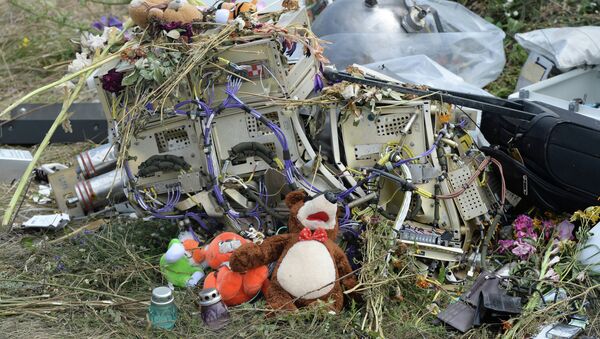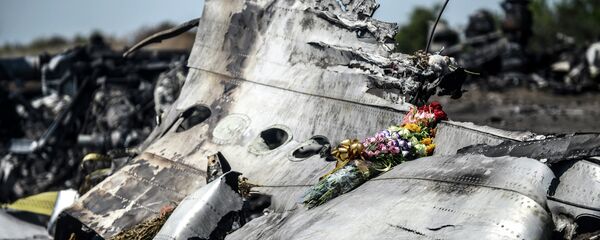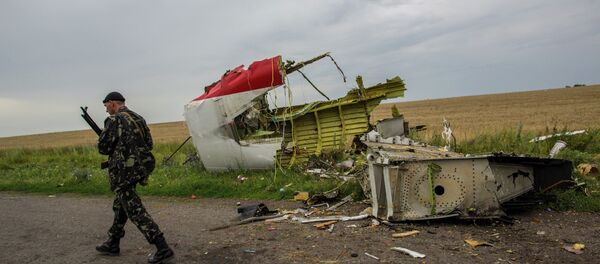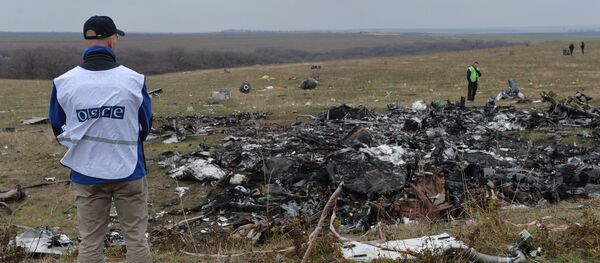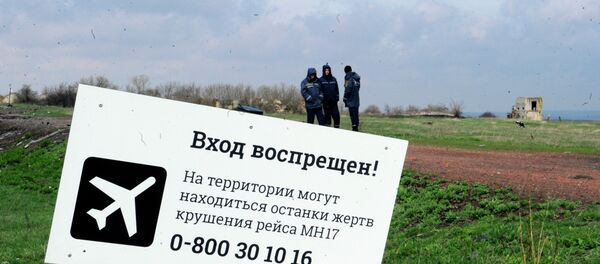MOSCOW (Sputnik) — The Malaysia Airlines passenger plane crashed while flying from Amsterdam to Kuala Lumpur over the eastern Ukrainian region of Donetsk on July 17, 2014. All 298 people on board, mostly Dutch citizens, perished in the incident.
A final Dutch Safety Board report is due October 13. Preliminary findings stated that the passenger jet broke up in mid-air after being hit by several high-energy objects.
Ukraine and its Western allies blame the militia in the country’s east, which allegedly had been provided with weapons by Russia, for downing the aircraft. The militia claimed that they did not have weapons capable of bringing down high-altitude aircraft and blame Kiev forces for the plane crash.
Social Networks, Not Mathematics
"The fact is our colleagues had some politicized view immediately after the disaster, when they reviewed not the technical side of the issue, but some other aspects. They state without any proof, without backing their words," Maslov told RIA Novosti.
Maslov underlined that a more accurate research should be carried out, such as the inquiry by Russian arms manufacturer Almaz-Antey, which was published earlier this year and revealed that the Malaysian plane was downed by a guided missile launched from a Buk-M1 system.
"Several months ago, Almaz-Antey carried out quite serious work with each figure and word counted, involving mathematics and simulation tests. In my opinion, they [the Dutch Safety Board] could do no announcement and postpone it to the next year and then further delay it," Maslov added.
Russia's Opinion Not Taken Into Account
"From the beginning it was started as a biased investigation, which did not involve Russia as its opinion was not taken into account. The Boeing didn’t even crashed yet, when [US State Secretary John] Kerry blamed Russia for this — the same conclusions will be presented. They will blame Russia and [Donbass] militias, although it is not true and you know it," Lt. Gen. Alexander Luzan, a former deputy chief of the Russian Land Force’ Air Defense Troops told RIA Novosti.
The objectivity of Dutch experts "can be counted out" as the investigation was conducted in secrecy, according to Lt. Gen. Vladimir Avdeev, a former chief of Moscow Military District's Air Defense Troops.
"I think someone controls these experts, because they do not ask our opinion, do not consider our version, so we cannot count on their objectivity. It is noteworthy that all of the information was promptly shut down, including the negotiation of air traffic controllers and the satellite photos," Avdeev said.
Russia's Discontent
In what media described as a "scathing" letter, the Russian official lambasted the Dutch Safety Board (DSB) in charge of the crash probe for going against the "principle of sequence of conclusions" by blaming the alleged downing on a Buk missile strike, before analyzing damage to the aircraft.
On Monday, Kremlin spokesman Dmitry Peskov said Russia had repeatedly expressed its disappointment over Dutch investigators ignoring the cooperation of Russian specialists.
Russian arms manufacturer Almaz-Antey, the manufacturer of Buk missile systems, will present on Tuesday the results of its simulation of the flight MH17 crash. In June, Almaz-Antey published the results of its inquiry into the crash, confirming that the plane could not have been shot down from areas controlled by local militia in eastern Ukraine.
The missile system has not been produced in Russia since 1999, but remains in the service of the Ukrainian Army, according to the manufacturer.
